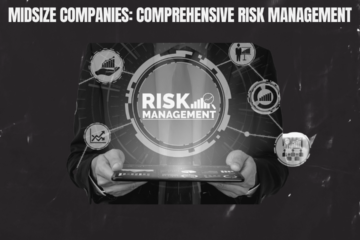AI’s Transformative Impact on the Financial Industry
Artificial intelligence (AI) is reshaping the financial industry, offering innovative solutions for investment strategies, risk management, fraud detection, and client personalization. For midsize financial management firms, adopting AI is no longer optional—it’s essential for remaining competitive in a technology-driven market.
This blog delves into the transformative role of AI in finance, providing actionable insights for midsize enterprises aiming to leverage this technology for growth and efficiency.
Streamlining Investment Strategies
AI simplifies investment strategies by analyzing massive datasets, detecting patterns, and offering actionable insights faster than traditional methods. Predictive analytics and machine learning models provide financial firms with the tools to stay ahead of market trends.
Examples of AI Tools
- Kavout employs machine learning to rank stocks using the Kai Score system, which analyzes historical trends and real-time data.
- BlackRock’s Aladdin Platform integrates AI to optimize risk analysis and portfolio management, making it particularly useful for midsize firms managing diverse client portfolios.
Practical Application
A midsize financial consultancy can use AI to forecast market movements and tailor portfolios to specific risk appetites. For example, SigFig enables automated portfolio management, reducing manual workload while delivering personalized client experiences.
Case Study
A midsize wealth management firm utilized AlphaSense to monitor market trends and streamline investment decisions. By automating its research processes, the firm increased its portfolio yield by 15% over a year while cutting research time in half.
Enhancing Risk Management
Risk management lies at the core of financial stability. AI excels in identifying risks through machine learning models that analyze patterns in market data and financial transactions.
AI Applications in Risk Management
- Riskalyze evaluates the risk tolerance of portfolios, enabling midsize firms to align client investments with their financial goals.
- AI-driven credit scoring systems use non-traditional data sources to assess borrower reliability, reducing default rates.
Example of Practical Use
A midsize enterprise can deploy AI models to simulate financial stress scenarios, ensuring resilience during market downturns. For instance, predictive tools can model the impact of geopolitical events on asset values, enabling firms to adjust portfolios preemptively.
Fraud Detection and Prevention
Fraud is a persistent threat in the financial sector, costing billions annually. AI-driven fraud detection systems offer an advanced line of defense, identifying anomalies and minimizing false positives.
AI Tools in Fraud Detection
- Feedzai uses real-time data analysis to detect unusual transaction patterns.
- Zest AI focuses on fraud prevention for loan underwriting by analyzing behavioral patterns.
Case Study Example
A midsize financial institution that adopted Feedzai saw a 40% reduction in fraudulent transactions within six months. The AI’s ability to learn from past fraud patterns enabled the institution to strengthen its defenses while maintaining compliance with regulatory standards.
Improving Client Services and Personalization
AI transforms client service by enabling tailored experiences that meet specific financial needs. Personalized recommendations, powered by AI, enhance client satisfaction and retention.
Examples of AI in Action
- Chatbots like those from Kasisto handle inquiries efficiently, providing quick responses without overwhelming human staff.
- Customer segmentation tools analyze spending habits and financial goals to offer targeted investment advice.
Practical Implementation for Midsize Firms
A financial consultancy can use AI tools to segment clients based on their investment behaviors, providing individualized strategies that boost customer loyalty. By integrating these technologies, midsize firms can compete effectively against larger institutions.
Revolutionizing Regulatory Compliance
Compliance with financial regulations is an ever-evolving challenge. AI simplifies this process by automating data analysis and reporting, ensuring adherence to complex regulatory requirements.
AI’s Role in Compliance
Tools like RegTech streamline compliance reporting, reduce errors, and lower operational costs. By integrating these solutions, midsize firms save valuable resources while maintaining their reputations.
Example of Success
A midsize firm used AI-powered compliance tools to meet the stringent requirements of the Sarbanes-Oxley Act. The automation of audit trails reduced compliance costs by 25%, enabling the firm to allocate more resources toward growth initiatives.
AI and Ethical Considerations
While AI offers immense benefits, it also raises ethical concerns, including data privacy and algorithmic bias. Midsize firms must implement ethical AI frameworks to mitigate these risks.
Best Practices for Ethical AI
- Conduct regular audits of AI models to ensure transparency and fairness.
- Invest in employee training to understand AI-driven decision-making.
- Prioritize data privacy by complying with regulations like the General Data Protection Regulation (GDPR).
AI as a Competitive Advantage
The adoption of AI is no longer just an efficiency booster—it’s a competitive differentiator. Firms leveraging AI to streamline operations, improve client interactions, and optimize investments position themselves as industry leaders.
Examples of Competitive Edge
- Firms using AI for real-time market analysis can offer quicker and more accurate investment advice.
- Personalized services powered by AI help midsize enterprises attract and retain clients who value tailored financial solutions.
Conclusion
AI is revolutionizing the financial industry, offering midsize firms opportunities to enhance efficiency, minimize risks, and improve client satisfaction. Strategic Financial Hub encourages businesses to embrace AI not only to remain competitive but also to unlock new avenues for growth.
For more insights and actionable advice on financial strategies, visit Hub’s Resources on the Strategic Financial Hub website. This section features in-depth articles designed to empower midsize financial management firms to implement financial management effectively.


